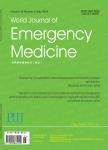Protective effect of mesenchymal stem cell-derived exosomal treatment of hippocampal neurons against oxygen-glucose deprivation/reperfusion-induced injury
Protective effect of mesenchymal stem cell-derived exosomal treatment of hippocampal neurons against oxygen-glucose deprivation/reperfusion-induced injury作者机构:Department of Emergencythe First Affi liated Hospital of Nanjing Medical UniversityNanjing 210029China Key Laboratory of Modern ToxicologyMinistry of EducationDepartment of ToxicologySchool of Public HealthNanjing Medical UniversityNanjing 211166China Key Laboratory of Modern ToxicologyMinistry of EducationDepartment of Environmental GenomicsSchool of Public HealthNanjing Medical UniversityNanjing 211166China Center for Drug Safety Evaluation and ResearchShanghai Institute of Materia MedicaShanghai 201203China
出 版 物:《World Journal of Emergency Medicine》 (世界急诊医学杂志(英文))
年 卷 期:2022年第13卷第1期
页 面:46-53页
核心收录:
学科分类:1002[医学-临床医学] 100204[医学-神经病学] 10[医学]
基 金:supported by a grant from the National Natural Science Foundation of China(81701872)。
主 题:Mesenchymal stem cells Exosomes Oxygen-glucose deprivation/reperfusion Reactive oxygen species Mitochondria
摘 要:BACKGROUND:Individuals who survive a cardiac arrest often sustain cognitive impairments due to ischemia-reperfusion injury.Mesenchymal stem cell(MSC)transplantation is used to reduce tissue damage,but exosomes are more stable and highly conserved than MSCs.This study was conducted to investigate the therapeutic effects of MSC-derived exosomes(MSC-Exo)on cerebral ischemia-reperfusion injury in an in vitro model of oxygen-glucose deprivation/reperfusion(OGD/R),and to explore the underlying mechanisms.METHODS:Primary hippocampal neurons obtained from 18-day Sprague-Dawley rat embryos were subjected to OGD/R treatment,with or without MSC-Exo treatment.Exosomal integration,cell viability,mitochondrial membrane potential,and generation of reactive oxygen species(ROS)were examined.Terminal deoxynucleotidyl transferase-mediated 2’-deoxyuridine 5’-triphosphate nickend labeling(TUNEL)staining was performed to detect neuronal apoptosis.Moreover,mitochondrial function-associated gene expression,Nrf2 translocation,and expression of downstream antioxidant proteins were determined.RESULTS:MSC-Exo attenuated OGD/R-induced neuronal apoptosis and decreased ROS generation(P0.05).The exosomes reduced OGD/R-induced Nrf2 translocation into the nucleus(2.14±0.65 vs.5.48±1.09,P0.01)and increased the intracellular expression of antioxidative proteins,including superoxide dismutase and glutathione peroxidase(17.18±0.97 vs.14.40±0.62,and 20.65±2.23 vs.16.44±2.05,respectively;P0.05 for both).OGD/R significantly impaired the mitochondrial membrane potential and modulated the expression of mitochondrial functionassociated genes,such as PINK,DJ1,LRRK2,Mfn-1,Mfn-2,and OPA1.The abovementioned changes were partially reversed by exosomal treatment of the hippocampal neurons.CONCLUSIONS:MSC-Exo treatment can alleviate OGD/R-induced oxidative stress and dysregulation of mitochondrial function-associated genes in hippocampal neurons.Therefore,MSCExo might be a potential therapeutic strategy to prevent OGD/R-induced neuronal injury.



